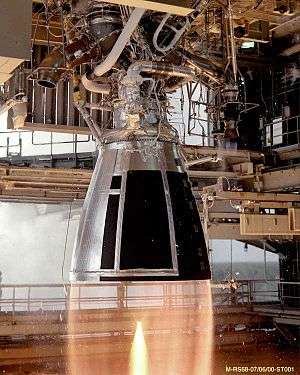RS-68
The Aerojet Rocketdyne RS-68 (Rocket System 68) is a liquid-fuel rocket engine that uses liquid hydrogen (LH2) and liquid oxygen (LOX) as propellants in a gas-generator power cycle. It is the largest hydrogen-fueled rocket engine ever flown.[3]
 An RS-68 engine undergoing hot-fire testing at NASA's Stennis Space Center during its developmental phase. | |
| Country of origin | United States |
|---|---|
| Manufacturer | Rocketdyne Pratt & Whitney Rocketdyne Aerojet Rocketdyne |
| Application | First stage engine for the Delta IV rocket |
| Status | Active |
| Liquid-fuel engine | |
| Propellant | Liquid oxygen / Liquid hydrogen |
| Configuration | |
| Nozzle ratio | 21.5 |
| Performance | |
| Thrust (SL) | RS-68: 660,000 lbf (2,950 kN) RS-68A: 705,000 lbf (3,137 kN)[1] |
| Thrust-to-weight ratio | RS-68: 45.3 RS-68A: 47.4 |
| Chamber pressure | 1,488 psi (10.26 MPa) |
| Isp (vac.) | RS-68: 410 s (4.0 km/s) RS-68A: 412 s (4.04 km/s)[2] |
| Dimensions | |
| Length | 17.1 ft (5.20 m) |
| Diameter | 8 ft 0 in (2.43 m) |
| Dry weight | RS-68: 14,560 lb (6,600 kg) RS-68A: 14,870 lb (6,740 kg)[1] |
| Used in | |
| Delta IV | |
Its development started in the 1990s with the goal of producing a simpler, less-costly, heavy-lift engine for the Delta IV launch system. Two versions of the engine have been produced: the original RS-68 and the improved RS-68A. A third version, the RS-68B, was planned for the National Aeronautics and Space Administration's (NASA) Ares V rocket before program cancellation.
Design and development
One of the main goals of the RS-68 program was to produce a simple engine that would be cost-effective when used for a single launch. To achieve this, the RS-68 has 80% fewer parts than the multi-launch Space Shuttle Main Engine (SSME).[4] The adverse consequences of this simplicity were a significantly lower thrust-to-weight ratio and a 10% lower specific impulse compared to the SSME. The benefit of this simplicity is the RS-68's reduced construction cost.[4]
The RS-68 was developed at Rocketdyne Propulsion and Power, located in Canoga Park, Los Angeles, California, where the SSME was manufactured. It was designed to power the Delta IV Evolved Expendable Launch Vehicle (EELV). The initial development engines were assembled at the nearby Santa Susana Field Laboratory where the Saturn V's Rocketdyne F-1 engines were developed and tested for the Apollo missions to the Moon. The initial testing of the RS-68 occurred at the Air Force Research Laboratory (AFRL), Edwards Air Force Base, California, and later at NASA's Stennis Space Center. The RS-68 was certified in December 2001 for use on Delta IV rockets.[5]
An RS-68 is part of each Delta IV Common Booster Core. The largest of the launch vehicles, the Delta IV Heavy, uses three CBCs mounted together.[6]
At its maximum 102% thrust, the engine produces 758,000 pounds-force (3,370 kN) in a vacuum and 663,000 pounds-force (2,950 kN) at sea level. The engine's mass is 14,560 pounds (6,600 kg). With this thrust, the engine has a thrust-to-weight ratio of 51.2 and a specific impulse of 410 seconds (4.0 km/s) in a vacuum and 365 seconds (3.58 km/s) at sea level.[7] The RS-68 is gimbaled hydraulically and is capable of throttling between 58% and 102% thrust.[8]
The RS-68A is an updated version of the RS-68, with increased specific impulse and thrust (to over 700,000 pounds-force (3,100 kN) at sea level).[9] The first launch on June 29, 2012, from the Cape Canaveral Air Force Station used three RS-68A engines mounted in a Delta IV Heavy rocket.[10]
Proposed uses
In 2006, NASA announced an intention to use five RS-68 engines instead of SSMEs on the planned Ares V. NASA chose the RS-68 because of its lower cost, about $20 million per engine including the cost of NASA's upgrades. The upgrades included a different ablative nozzle to accommodate a longer burn, a shorter start sequence, hardware changes to limit free hydrogen at ignition, and a reduction in the amount of helium used during countdown and flight. Thrust and specific impulse increases would occur under a separate upgrade program for the Delta IV rocket.[11] Later, the Ares V was changed to use six RS-68 engines, designated the RS-68B.[12] Ares V was dropped as part of the cancellation of the Constellation program in 2010.[13] NASA's current successor heavy-lift vehicle, the Space Launch System, will use four RS-25 engines instead.[14]
Human-rating
In 2008, it was reported that the RS-68 needs over 200 changes to receive a human-rating certification.[15] NASA has stated that those changes include health monitoring, removal of the fuel-rich environment at liftoff, and improving the robustness of its subsystems.[16][17]
Variants
- RS-68 is the original version. It produces 663,000 pounds-force (2,950 kN) thrust at sea level.[18]
- RS-68A is an improved version. It produces 705,000 lbf (3,140 kN) thrust at sea level and 800,000 lbf (3,560 kN) thrust in a vacuum.[19] Its specific impulse in a vacuum is 414 seconds (4.06 km/s). Certification testing was completed in November 2010.
- RS-68B was a proposed upgrade to be used in the Ares V launch vehicle for NASA's Constellation program.[12] The Ares V was to use six RS-68B engines on a 10 metres (33 ft) diameter core stage, along with two 5.5-segment solid rocket boosters. It was later determined that the ablative nozzle of the RS-68 was poorly suited to this multi-engine environment, causing reduced engine efficiency and extreme heating at the base of the vehicle.[20]
See also
References
- "DELTA IV". United Launch Alliance. Archived from the original on July 20, 2014. Retrieved July 13, 2014.
- "Delta IV User's Guide" (PDF). United Launch Alliance. June 2013. Archived (PDF) from the original on July 10, 2014. Retrieved July 13, 2014.
- "ATK Propulsion and Composite Technologies Help Launch National Reconnaissance Office Satellite" (Press release). Alliant Techsystems. January 19, 2009. Archived from the original on February 22, 2014.
- "AIAA 2002-4324, Propulsion for the 21st Century—RS-68" Archived March 19, 2009, at the Wayback Machine. AIAA, July 8–10, 2002.
- "Rocketdyne RS-68 Engine Certified for Boeing Delta IV" (Press release). Boeing. December 19, 2001. Archived from the original on October 10, 2012.
- "Atlas V and Delta IV Technical Summary" (PDF).
- "United Launch Alliance Delta IV Heavy".
- Boeing white paper on RS-68 development Archived April 15, 2007, at the Wayback Machine
- "United Launch Alliance First RS-68A Hot-Fire Engine Test a Success" (Press release). United Launch Alliance. September 25, 2008. Retrieved September 30, 2008.
Currently, the RS-68 engine can deliver more than 660,000 pounds of sea level thrust and the upgraded RS-68A will increase this to more than 700,000 pounds. The RS-68A also improves on the specific impulse, or fuel efficiency, of the RS-68.
- "United Launch Alliance Upgraded Delta IV Heavy rocket successfully Launches Second Payload in Nine Days for the National Reconnaissance Office" (Press release). United Launch Alliance. June 29, 2012. Archived from the original on August 20, 2016.
- "NASA's Exploration Systems Progress Report" (Press release). National Aeronautics and Space Administration. May 18, 2006. Archived from the original on March 28, 2012. Retrieved May 30, 2006.
- "Overview: Ares V Cargo Launch Vehicle". National Aeronautics and Space Administration. Archived from the original on September 26, 2008. Retrieved September 30, 2008.
- Amos, Jonathan (11 October 2010). "Obama signs Nasa up to new future". BBC news. Retrieved 7 June 2019.
- "Space Launch System Factsheet" (PDF). National Aeronautics and Space Administration. Retrieved 7 June 2019.
- "United Launch Alliance First RS-68A Hot-Fire Engine Test a Success". NASAspaceflight.com. September 27, 2008. Archived from the original on March 28, 2018.
- "Frequently Asked Questions, question 3". National Aeronautics and Space Administration ESMD. Archived from the original on January 12, 2010.
- Bearden, David A.; Skratt, John P.; Hart, Matthew J. (June 1, 2009). "Human Rated Delta IV Heavy Study Constellation Impacts" (PDF). National Aeronautics and Space Administration. p. 8. Archived (PDF) from the original on February 28, 2017.
- "RS-68 Propulsion System" (PDF). Pratt & Whitney Rocketdyne. October 2005. Archived from the original (PDF) on 2018-07-14. Retrieved 2019-04-07.
- "P&W Successfully Completes Hot-Fire Test on 2nd RS-68A Certi". asdnews.com. Archived from the original on July 25, 2011. Retrieved April 25, 2018.
- "The engines that refused to retire – RS-25s prepare for SLS testing". nasaspaceflight.com. June 2013. Archived from the original on August 30, 2017.
External links
| Wikimedia Commons has media related to RS-68 (rocket engine). |
- Aerojet Rocketdyne's RS-68 page
- RS-68 page on Astronautix.com
- Wood, B.K. (2002). Propulsion for the 21st Century—RS-68. 38th Joint Liquid Propulsion Conference. Indianapolis, Indiana: AIAA. Archived from the original (doc) on 2009-03-19.
